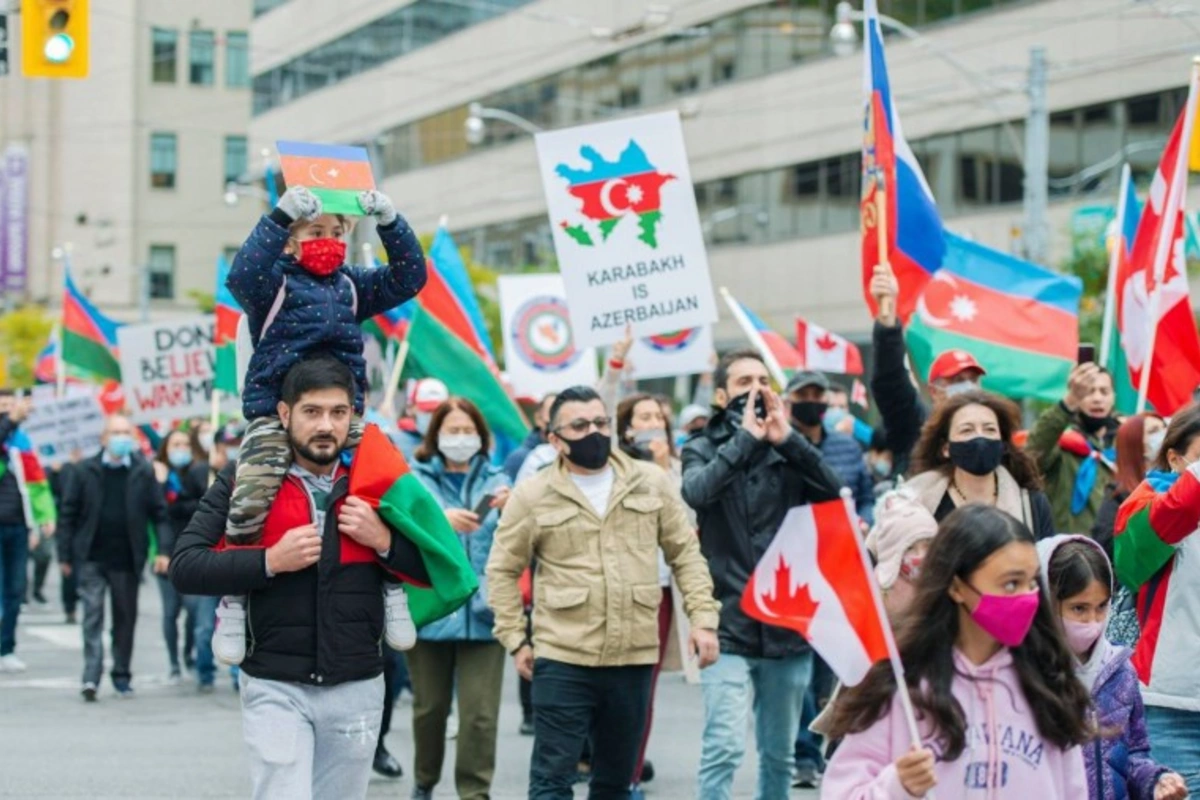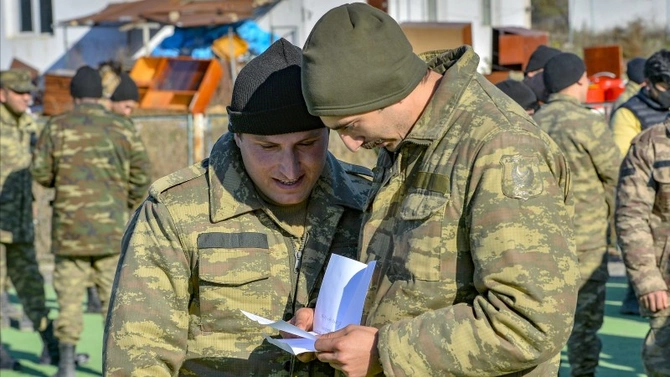
Canadian peacekeepers have learned at great cost that simply drawing a line across the past only goes halfway to making a peaceful present and future.
Azerbaijani-Canadians protest in Toronto on October 22, 2020. Photo: Jamal Yahya
When something happens in the territories of Armenia and Azerbaijan, my historian ears tingle, and I pay close attention. I have spent forty years studying religion and human conflict. I have walked battlefields and, with my students, have seen the remains of battle and sometimes the warriors themselves, which we reverently replaced under the earth from which they emerged.
So, I paid very close attention to the fighting and territorial changes between Armenia and Azerbaijan in the 1980s and 1990s. As a specialist on the First World War and its aftermath, the name Armenia immediately caught my ear and led me to pursue the story. That led me to the story of Azerbaijan. I followed the news, read some of the books, and waited (with a sense of the inevitable) for what would come in another generation. Here we are. History and the currents of blood and soil, as well as religion, run deep. I do not follow it unmoved.

Many Canadians, perhaps most, know or have heard little about the background of the Second Armenian-Azerbaijani war of 2020. When they hear about it, most view it as another terrible thing that has happened to Armenians. Few have examined the roots of the earlier conflict or that Azerbaijan was reclaiming territory unanimously considered Azerbaijani in international law. Azerbaijan does not have as prominent or sympathetic a place in Canadian memory, nor perhaps foreign policy. Azerbaijanis in Canada were often outraged by news coverage that left their homeland in the dark. “Why,” they asked. Here are some suggestions.
Armenia’s profile in Canadian thinking has been profoundly shaped by what happened in the First World War. When reports of Armenian suffering reached the Allies from American missionaries on the scene, our country reacted with shock and outrage. The Canadian churches, which still shaped much public opinion, felt helpless, but they did add the situation to their list of wartime tragedies caused by our enemies (such as the occupation of Belgium), as they did later with the post-war chaos in Russia and the Caucasian states. Armenian refugees have been received here and have told their story well. I first heard about these at my grandmother’s knee - perhaps because we are Scottish, the stories of the persecuted have always been part of our family culture. Such tales may have created a permanent if sometimes dormant memory. They have been influential in shaping policy and public memory and have caused some tensions within the NATO alliance. When I taught undergraduate history in Canadian universities and colleges, my students of Armenian parentage quickly staked out their turf: they ensured that I knew their story. Whether consciously or unconsciously, this still influences how Canadians, and especially Canadian media, select and cover the news from the Caucasus. The memory has been reactivated: most Canadians instinctively believe that Armenia is somehow justified no matter what the context.
Then there is the place of religion. Armenian Christianity and its ancient roots stir sympathy in Christian circles. In our post-911 generation, stereotypes around Islam have slanted many towards suspicion of Azerbaijan’s motives and grievances simply because of the impression given by its enemies that any majority Muslim nation can be a harbour for jihad. Many do not know the secular history and constitution of Azerbaijan, and if they are informed of it, they remain skeptical.
Then there is the Turkish involvement, not in fighting, but in supplying modern arms and political/diplomatic support for Azerbaijan’s re-armament. Canadians are very uncomfortable with the current actions and posture of Turkey, internally and externally. They are bombarded with reports of internal unrest, Turkish actions along the Syrian border, and its willingness to challenge NATO allies.
Canadian International News Coverage and Social Media
The big issue in media is perhaps not history, religion, or diplomacy, but the structure of Canadian news reporting. Our media are not in the same physical, financial, or psychological shape they were a generation ago. They are smaller, struggling for money, and cutting their staff back ruthlessly. War coverage is expensive and dangerous. Watching the BBC, one could hear reports from seasoned correspondents on the ground on both sides. Back in London, senior commentators provided analysis and collated the reports, providing more detailed coverage of the conflicting claims, the extent of the fighting, and the posturing of other nations attempting to mediate or exploit the situation in addition to the suffering. Though they were not permitted to see combat, these correspondents could offer coverage of the war’s overall movements, statements by leaders on both sides, and provide informed, if not exhaustive, coverage.
International news coverage by Canadian networks seems to be in a lull. Many of our most noteworthy and experienced reporters who have been foreign correspondents are hosting network news in Canada. They monitor affairs from London or other sites through wire services, news flashes, government statements, and clips which will generally portray and emphasize suffering and the tragedies of war rather than giving deep analysis. Other networks are victims of false news from dubious sources until the fact-checkers catch them out (which has taken place in both the Caucasian and Ethiopian cases). I suggest that perceptions going back to 1915 and 1916 have influenced much of our Canadian coverage. I cannot recall the Canadian media showing detailed maps or explaining how the fighting involved Azerbaijan’s territory – Karabakh and adjacent areas - or how losing these have led Armenians to leave scorched earth behind. So, without adequate explanation, without anyone explicitly linking the past conflicts with this last war, Canadians may, out of ignorance and some apathy, judge this as just one more drama of mindless destruction, not a carefully and skillfully waged example of state policy. They may even believe that as the Azerbaijani head of state proclaimed, that the victory brings closure to the whole affair.
Then, we have social media. Although some Azerbaijani efforts made an impression, the overwhelming weight of famous diaspora members and sympathizers gave an advantage to the Armenian narrative. While Canadian do not necessarily follow all American social media stars and influencers, many of us do. Without the critical influences of media and educational influencers providing the same volume, depth, and analysis of Azerbaijan’s case, its successes versus its excesses cannot be communicated well. Even if we were to dismiss much of the social media campaign or see it as influencing only the naïve and impressionable, here was an Armenian victory. Although it had little influence on the battlefield, it still shapes western perceptions.
And that returns us to the public perception of Azerbaijan as a Goliath type, persecuting and punishing the little David, Armenia, with Turkey aiding and abetting Azerbaijan’s aggression. In Canada and in the United States, where some Christian organizations play to this stereotype, the naïve, unhistorical, and less informed perspective became another “fact” in the Caucasian story. It is an old one, which distorts perceptions and influences how events are interpreted and passed on to others, especially our children.
It is another chapter in the battle for history and requires honest research and engagement. This acceptance of baseless ‘truth’ is an old, old story and a treacherous thing to let pass. Nursing past injustice and grievances, mingled with blood and tales of sacred soil and the favour of the Almighty, made the twentieth century the bloodiest in human history. Canadian peacekeepers have learned at great cost that simply drawing a line across the past only goes halfway to making a peaceful present and future. The other half, not forgetting, but forgiving and reconciliation, is the work of generations - fraught with setbacks but worth the sacrifice. My hope and prayer is that there might be a future like that for the Caucasus in good time.
Share on social media